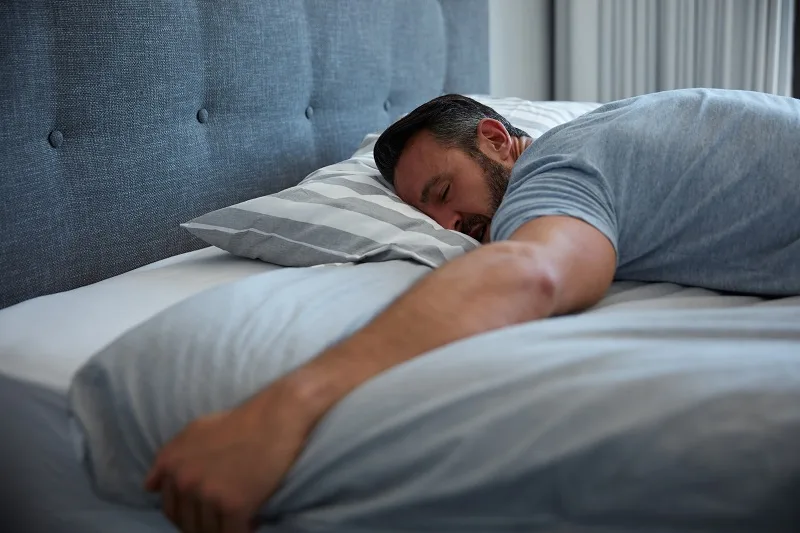Sweet Dreams Ahead: Using Weight Loss to Conquer Sleep Apnea
Sleep apnea is a disruptive and potentially dangerous sleep disorder affecting over 22 million Americans. Its frustrating symptoms like loud snoring, chronic fatigue, and lapses in breathing can greatly diminish one’s quality of life. While CPAP machines are often prescribed, emerging research shows weight loss could provide lasting relief instead. Shedding excess pounds may be the key to effectively curing sleep apnea for good.

The Complex Interplay Between Obesity and Sleep Apnea
To understand how weight loss can treat sleep apnea, you first need to understand the relationship between excess weight and this disorder.
How Excess Weight Contributes to Sleep Apnea Development
Carrying extra body fat, especially in the neck region, constricts the anatomy of the airways. Fat deposits narrow the passages and put direct pressure on the surrounding throat muscles. This physical obstruction prevents smooth, continuous breathing during sleep.
Studies show that overweight individuals are at a far higher risk for developing sleep apnea. Their narrowed airways are more prone to collapsing during sleep. The more excess weight a person carries, the more severe their sleep apnea is likely to become. Obesity leads to a structural vulnerability that causes pronounced breathing impairments at night.
Understanding the Mechanics of Sleep Apnea and Breathing Disruptions
So what exactly happens during a sleep apnea episode? In sleep apnea, the soft tissues in the back of the throat relax during sleep, causing the airway to become blocked. Oxygen levels drop rapidly as breathing stops temporarily. This is called an apnea event.
Eventually the lack of oxygen triggers the brain to partially wake up and tighten the throat muscles to open the airway. At this point, the person may take a huge gasping breath and make loud snorting or choking noises. This disruptive cycle can repeat 30 or more times per hour all night long.
Needless to say, constantly waking up gasping throughout the night prevents you from ever reaching the deep, restorative stages of sleep. This leads to chronic fatigue no matter how many hours you spend in bed.

Success Stories: How Weight Loss Transformed Sleep Apnea
Could simply slimming down banish these debilitating sleep apnea symptoms for good? Emerging research along with many inspirational case studies demonstrate weight loss as a potentially life-changing cure.
Dramatic Personal Accounts of Reversing Sleep Apnea Through Weight Loss
There are many remarkable stories of obese individuals completely resolving their severe sleep apnea by losing weight through diet, exercise or bariatric surgery.
For example, one man in his 60s who had suffered from sleep apnea for years lost 125 pounds after having bariatric surgery. His apnea symptoms disappeared entirely afterwards. He was able to stop using his CPAP machine that had been previously required to help him breathe at night.
Similarly, a woman with obesity lost 80 pounds by making healthy modifications to her diet and exercise routine over 7 months. She went from having severe sleep apnea to having no episodes of disrupted breathing. Her sleep quality improved dramatically.
These inspiring case studies demonstrate that for some overweight sleep apnea patients, losing excess weight can mean the difference between dependence on cumbersome breathing machines versus resting easy with natural, uninterrupted sleep.
Clinical Research Validating Weight Loss as an Effective Sleep Apnea Treatment
Scientific studies further validate the power of weight loss against obstructive sleep apnea. In one major randomized controlled study of overweight adults with sleep apnea, patients who lost nearly 10% of their body weight saw significant improvements in their apnea symptoms.
Researchers found that dropping excess pounds decreased the frequency of apnea events during sleep by approximately 40%. This allowed patients to reach deeper stages of restorative sleep. For some, their sleep apnea resolved entirely through weight loss interventions.
In another study, sedentary obese adults who lost 5% of their weight through diet and exercise saw considerable improvements in their sleep apnea severity. Reducing BMI through sustained lifestyle changes offered lasting relief from symptoms.

Embarking on Your Weight Loss Journey for Better Sleep
Ready to lose weight and find relief from your sleep apnea? With guidance from your physician, you can customize a lifestyle change plan to slim down in a healthy, sustainable way. Include these key strategies:
Adopting an Anti-Inflammatory, Whole Food Diet to Lose Weight
Making smart dietary choices is key for both weight loss and reducing inflammation that worsens sleep apnea. Adopt a Mediterranean-style diet rich in fruits, vegetables, lean proteins, whole grains, fish and healthy fats from nuts and olive oil. This nourishes the body while encouraging fat burning.
Limit sugary refined carbs and processed foods which spike blood sugar and promote weight gain. Avoid large meals before bedtime which exacerbate apnea from abdominal fat pressing on the diaphragm. Stay hydrated to flush toxins.
Adding Regular Exercise to Your Routine for Better Sleep
Along with dietary adjustments, exercise helps accelerate weight loss and improve sleep apnea severity. Aim for 150 minutes per week of moderate aerobic activity like brisk walking or swimming. This burns calories, strengthens respiratory muscles, and stimulates oxygen circulation.
Consider adding yoga, which targets excess neck fat while also reducing stress. Building lean muscle through light strength training can further boost metabolic rate. Move your body daily for optimal anti-apnea effects.
Making Lifestyle Changes That Support Your Overall Health and Wellbeing
There are additional lifestyle steps you can take to aid your weight loss efforts while promoting quality sleep. Establish an earlier bedtime and consistent wake-up schedule to stabilize your circadian rhythm. Avoid alcohol and heavy meals at night. Stop cigarette smoking which worsens breathing problems. Manage emotional stress through journaling, deep breathing exercises, meditation or prayer. Monitor your progress and celebrate each small success.

The Benefits of Weight Loss Go Beyond Just Improving Sleep Apnea
Losing excess weight does more than just reduce or potentially eliminate sleep apnea symptoms – it also leads to profound overall wellness benefits:
You’ll Wake Up Feeling Refreshed and Energized Every Morning
When you drop unhealthy pounds and your breathing normalizes during sleep, you’ll awaken feeling truly restored instead of drained. Your concentration, productivity and mental clarity will skyrocket. You’ll have the energy needed to seize each day.
Weight Loss Protects Against Other Serious Conditions Like Heart Disease
Sleep apnea severely stresses the body and raises your risk for numerous metabolic disorders over time like high blood pressure, heart attack, stroke and type 2 diabetes. Shedding excess weight takes pressure off your cardiorespiratory system, lowering inflammation and reducing these threats.
Sweet Dreams Ahead: Using Weight Loss to Conquer Sleep Apnea
Don’t resign yourself to a disruptive lifelong sleep disorder or reliance on CPAP machines. Take control of your health by making a commitment to weight loss today. With dedication and support, you can correct the anatomical vulnerabilities causing your apnea, normalize your breathing, sleep better, and reclaim your energy. The first step starts now – work with your doctor to map your personalized path to victory over sleep apnea.
Thank you for reading this post, don't forget to subscribe to our free newsletter
!